Citizens Demanding Justice from CPS, Social Services, Courts, Elected Officials and Governmental Agencies Judges, and attorneys that are corrupt and failing to protect us.
Showing posts with label Rascism. Show all posts
Showing posts with label Rascism. Show all posts
Wednesday, October 5, 2016
Monday, August 29, 2016
The National Anthem: Symbol of Rascism
What you do not know about the National Anthem?
It glorifies the murder of slaves and was written by a bigoted racist. President Woodrow Wilson made the poem written by Francis Scott Key the national anthem, he himself was a racist and he signed legislation into law ...written by bankers...that is the cause of all of our financial woes today...the enactment of the FEDERAL RESERVE.
Key fought for slavery and his family made a fortune supporting slavery. As Washington, DC District Attorney, he inflicted many injustices on black people. He is a poster child of a racist.
Key fought for slavery and his family made a fortune supporting slavery. As Washington, DC District Attorney, he inflicted many injustices on black people. He is a poster child of a racist.
See this story on him: http://www.nydailynews.com/news/national/king-stand-star-spangled-banner-article-1.2770075
See the poem here:
Defence Of Fort Mchenry (Stars And Stripes Forever) -
O! say can you see, by the dawn's early light,
What so proudly we hail'd at the twilight's last gleaming,
Whose broad stripes and bright stars through the perilous fight,
O'er the ramparts we watch'd, were so gallantly streaming?
And the rockets' red glare, the bombs bursting in air,
Gave proof through the night that our flag was still there -
O! say, does that star-spangled banner yet wave
O'er the land of the free, and the home of the brave?
On the shore, dimly seen through the mists of the deep,
Where the foe's haughty host in dread silence reposes,
What is that which the breeze o'er the towering steep,
As it fitfully blows, half conceals, half discloses?
Now it catches the gleam of the morning's first beam,
In full glory reflected now shines on the stream -
'Tis the star-spangled banner, O! long may it wave
O'er the land of the free, and the home of the brave.
And where is that band who so vauntingly swore
That the havock of war and the battle's confusion
A home and a country should leave us no more?
Their blood has wash'd out their foul foot-steps' pollution,
No refuge could save the hireling and slave,
From the terror of flight or the gloom of the grave;
And the star-spangled banner in triumph doth wave
O'er the land of the free, and the home of the brave.
O! thus be it ever when freemen shall stand
Between their lov'd home, and the war's desolation,
Blest with vict'ry and peace, may the heav'n-rescued land
Praise the power that hath made and preserv'd us a nation!
Then conquer we must, when our cause it is just,
And this be our motto - 'In God is our trust! '
And the star-spangled banner in triumph shall wave
O'er the land of the free, and the home of the brave.
Francis Scott Key
Wednesday, December 9, 2015
DOT LAUNCHES INVESTIGATION IN ALABAMA OVER DMV CLOSURES
http://www.cnn.com/2015/12/09/politics/alabama-dmv-closures-voting-rights/index.html
DOT launches investigation in Alabama over DMV closures
By Rene Marsh, CNN Aviation and Government Regulation Correspondent
Updated 11:54 AM ET, Wed December 9, 2015
Story highlights
- The U.S. Department of Transportation has just launched an investigation into Alabama
- The case revolves around the closing of Department of Motor Vehicle offices and whether that discriminates against African-Americans
Washington (CNN)The U.S.
Department of Transportation has just
launched an investigation into whether
Alabama is discriminating against
African-American residents after
announcing plans to shut down or
reduce service at 34 state drivers license
offices.
Department of Transportation has just
launched an investigation into whether
Alabama is discriminating against
African-American residents after
announcing plans to shut down or
reduce service at 34 state drivers license
offices.
Voting rights advocates say the move will
disenfranchise lower income, African-American voters in rural communities who
wish to vote.
disenfranchise lower income, African-American voters in rural communities who
wish to vote.
In 2014, Alabama passed a law requiring valid photo ID in order to vote at the polls.
Transportation Secretary Anthony Foxx says his agency is specifically looking into
whether the closures violate the Title VI of the Civil Rights Act of 1964, which
prohibits discrimination on the basis of race, color or national origin on programs
and activities receiving federal assistance.
whether the closures violate the Title VI of the Civil Rights Act of 1964, which
prohibits discrimination on the basis of race, color or national origin on programs
and activities receiving federal assistance.
"Driver license offices offer essential services to the American people, including
providing thousands in Alabama with a method of identification. It is critical that
these services be free of discrimination, and serve the people of the state fairly
and equally," Foxx said.
providing thousands in Alabama with a method of identification. It is critical that
these services be free of discrimination, and serve the people of the state fairly
and equally," Foxx said.
On September 30, Alabama announced the closure and reduction in services at 34
drivers licensing offices throughout the state. The Alabama Law Enforcement
Agency has said an $11 million cut in the budget forced the closing of the DMV
offices at which residents can obtain or renew their licenses. The state expects
some of the needs of those who would have used such offices to be met online.
drivers licensing offices throughout the state. The Alabama Law Enforcement
Agency has said an $11 million cut in the budget forced the closing of the DMV
offices at which residents can obtain or renew their licenses. The state expects
some of the needs of those who would have used such offices to be met online.
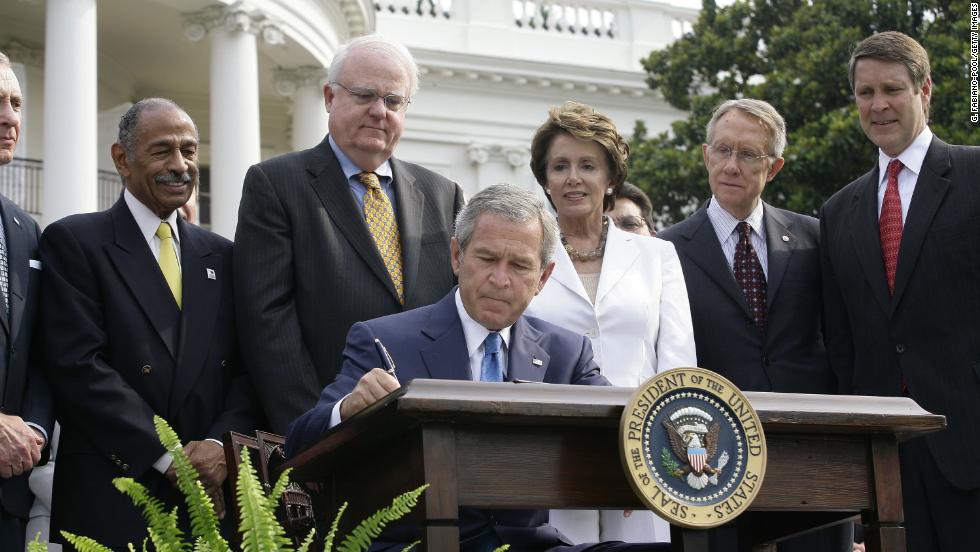
14 photos: Photos: The Voting Rights Act
The Voting Rights Act – President George W. Bush signs reauthorization of the act on July 27, 2006. From left, Rep. John Conyers, D-Michigan, Rep. James Sensenbrenner, R-Wisconsin, House Minority Leader Nancy Pelosi, D-California, Sen. Harry Reid, D-Nevada, and Sen. Bill Frist, R-Tennessee, look on.
Hide Caption
8 of 14
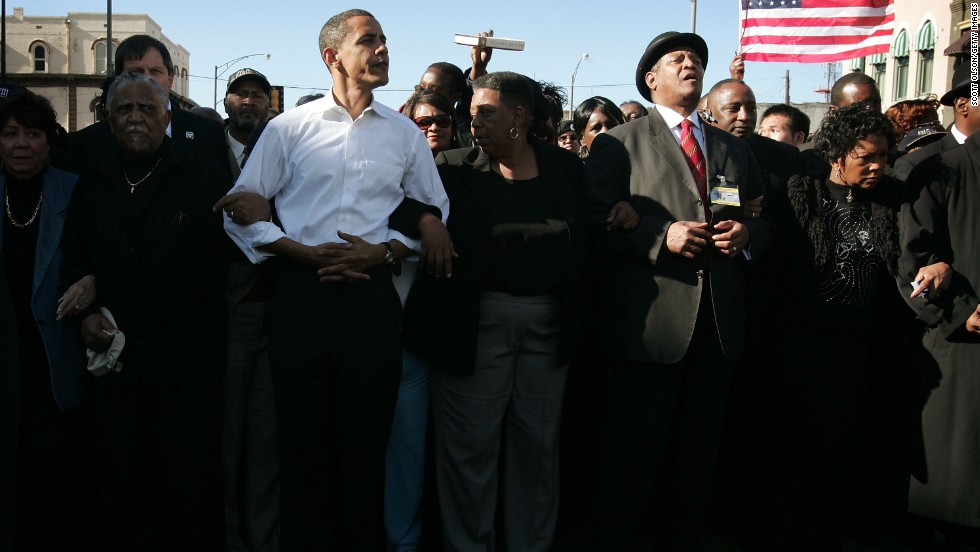
14 photos: Photos: The Voting Rights Act
The Voting Rights Act – President Barack Obama marches with civil right veterans during a commemoration march in 2007.
Hide Caption
9 of 14
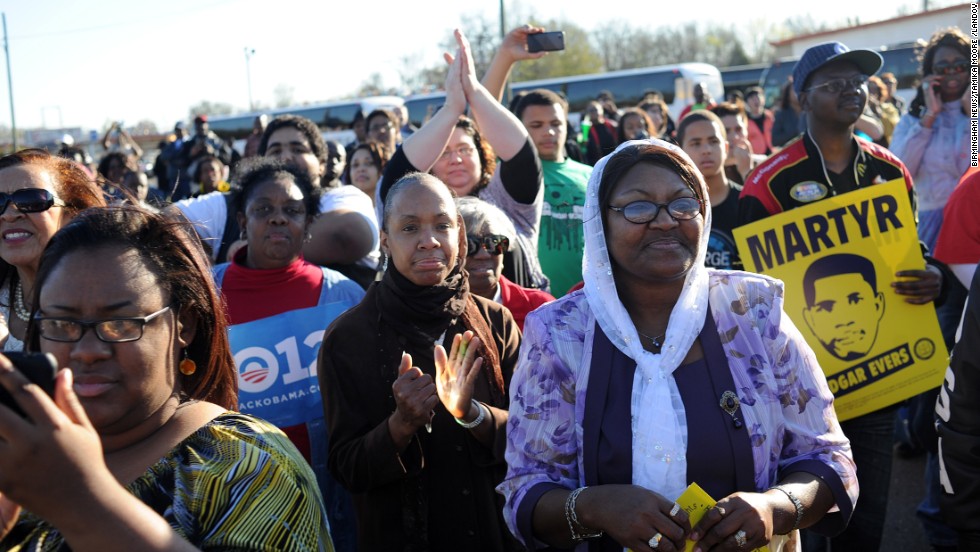
14 photos: Photos: The Voting Rights Act
The Voting Rights Act – A conservative judge called the Voting Rights Act a racial entitlement but supporters of the act say it is the crowning victory of the civil rights movement. Pictured, people gather for a post-march rally after crossing the Edmund Pettus Bridge on the "Bloody Sunday" anniversary, March 4, 2012.
Hide Caption
10 of 14
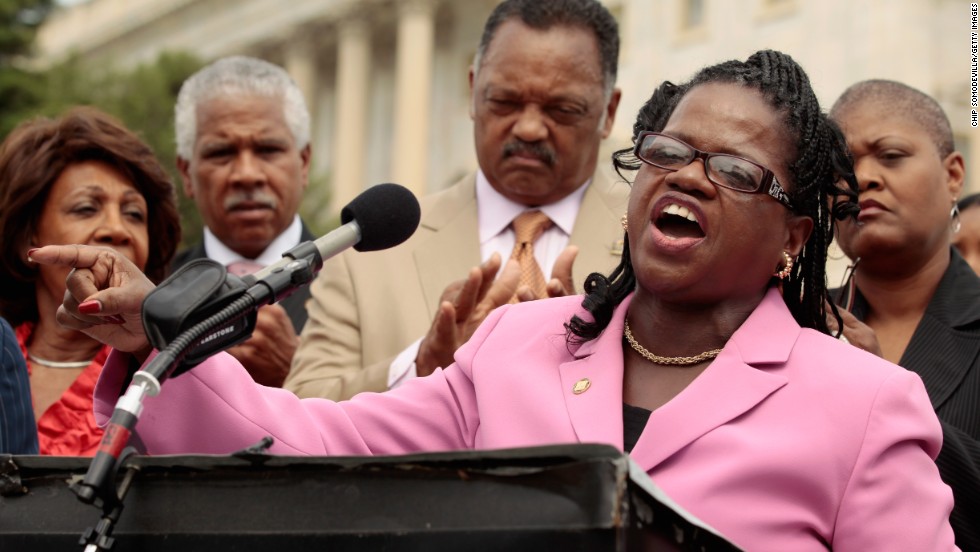
14 photos: Photos: The Voting Rights Act
The Voting Rights Act – Lawyers' Committee for Civil Rights Under Law Executive Director Barbara Arnwine speaks during a news conference to voice opposition to state photo ID voter laws with the Rev. Jesse Jackson and members of Congress at the U.S. Capitol July 13, 2011.
Hide Caption
11 of 14
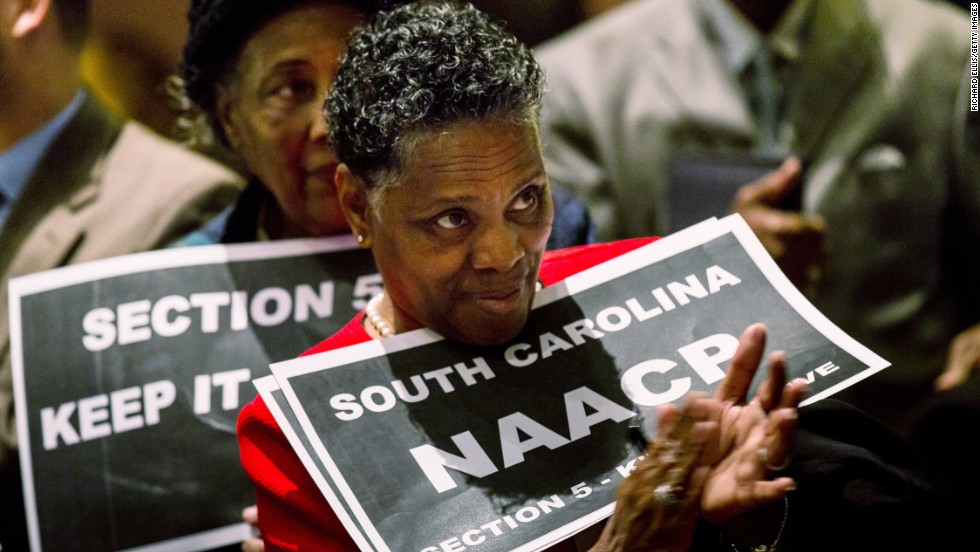
14 photos: Photos: The Voting Rights Act
The Voting Rights Act – A supporter of the Voting Rights Act rallies in the South Carolina State House in Columbia on February 26, 2013, the day before oral hearings at the Supreme Court.
Hide Caption
12 of 14
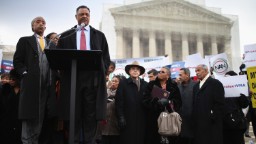
14 photos: Photos: The Voting Rights Act
The Voting Rights Act – The Rev. Jesse Jackson, at the microphone, and the Rev. Al Sharpton, left, deliver remarks during a rally outside the U.S. Supreme Court on February 27, 2013, as the court prepared to hear oral arguments in Shelby County v. Holder, the legal challenge to Section 5 of the Voting Rights Act.
Hide Caption
13 of 14
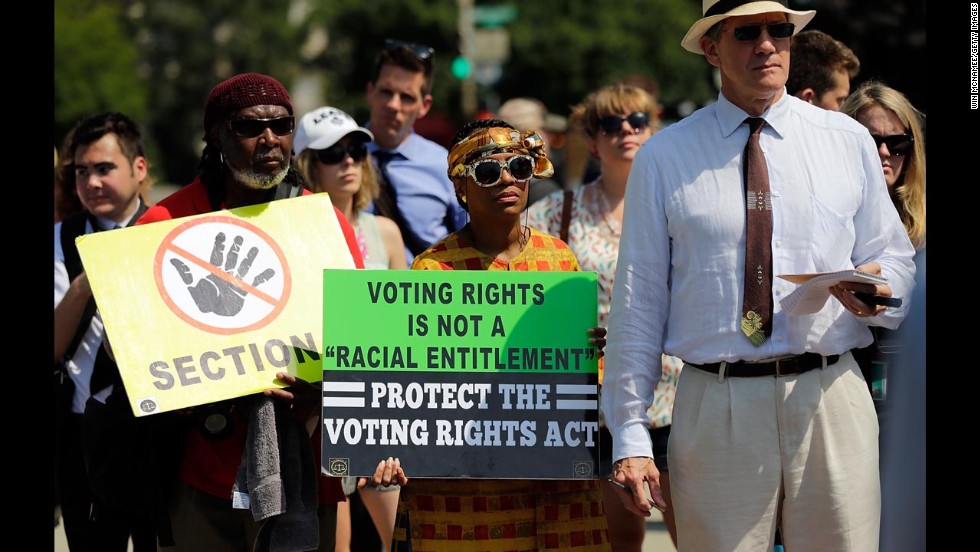
14 photos: Photos: The Voting Rights Act
The Voting Rights Act – Supporters of the Voting Rights Act listen to speakers discussing the rulings outside the U.S. Supreme Court building on Tuesday, June 25, 2013.
Hide Caption
14 of 14
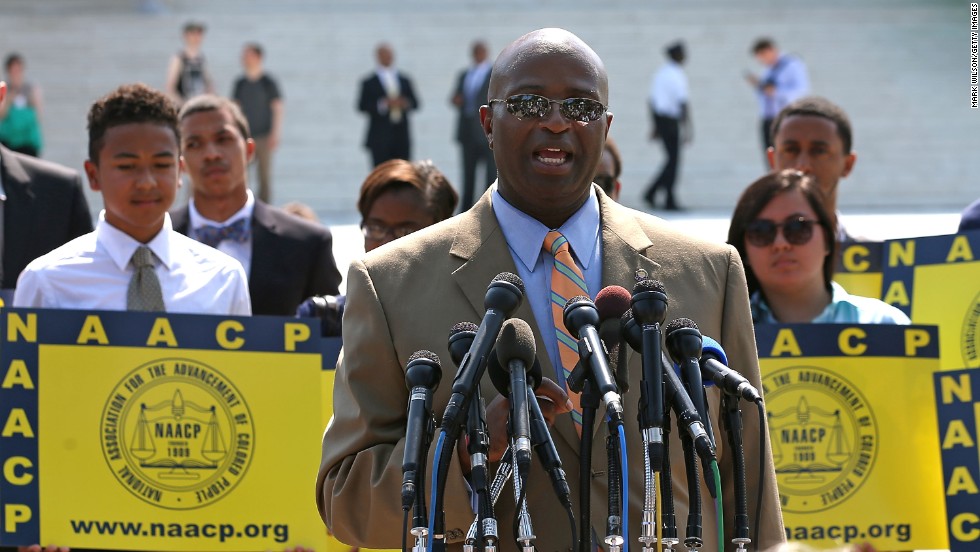
14 photos: Photos: The Voting Rights Act
The Voting Rights Act – The Voting Rights Act is often called the crown jewel of the civil
rights movement, yet many Americans do not know why or how it was passed. Pictured,
NAACP Field Director Charles White speaks on the steps of the U.S. Supreme Court on
Tuesday, June 25, 2013, after the court limited use of a major part of the landmark Voting Rights Act of 1965, in effect invalidating a key enforcement provision. Here are some key moments and
characters in the voting rights saga.
rights movement, yet many Americans do not know why or how it was passed. Pictured,
NAACP Field Director Charles White speaks on the steps of the U.S. Supreme Court on
Tuesday, June 25, 2013, after the court limited use of a major part of the landmark Voting Rights Act of 1965, in effect invalidating a key enforcement provision. Here are some key moments and
characters in the voting rights saga.
Hide Caption
1 of 14
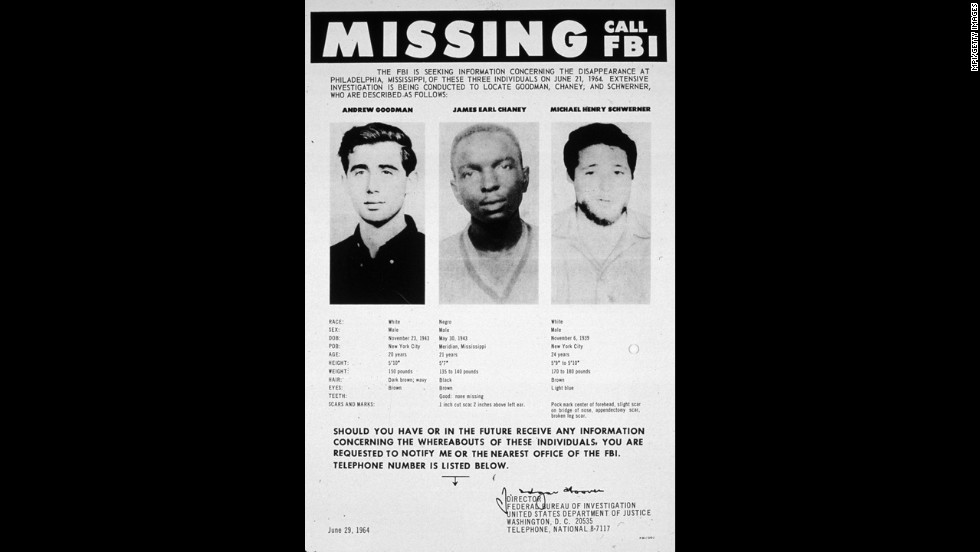
14 photos: Photos: The Voting Rights Act
The Voting Rights Act – Three young civil rights workers were murdered in 1964 in Mississippi while trying to register black voters. The infamous murders showed that segregationists were willing to kill to keep African-Americans from voting.
Hide Caption
2 of 14
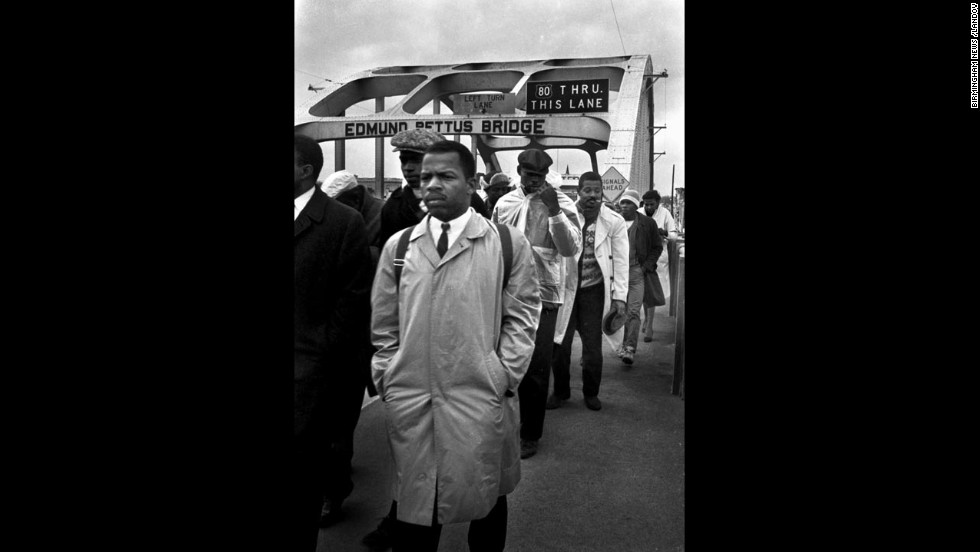
14 photos: Photos: The Voting Rights Act
The Voting Rights Act – John Lewis, a young activist who later became a congressman of Georgia, heads to a fateful encounter on the Edmund Pettus Bridge in Selma, Alabama during a 1965 march. Lewis was brutally assaulted by state troopers during the "Bloody Sunday" march that made voting rights a national issue.
Hide Caption
3 of 14
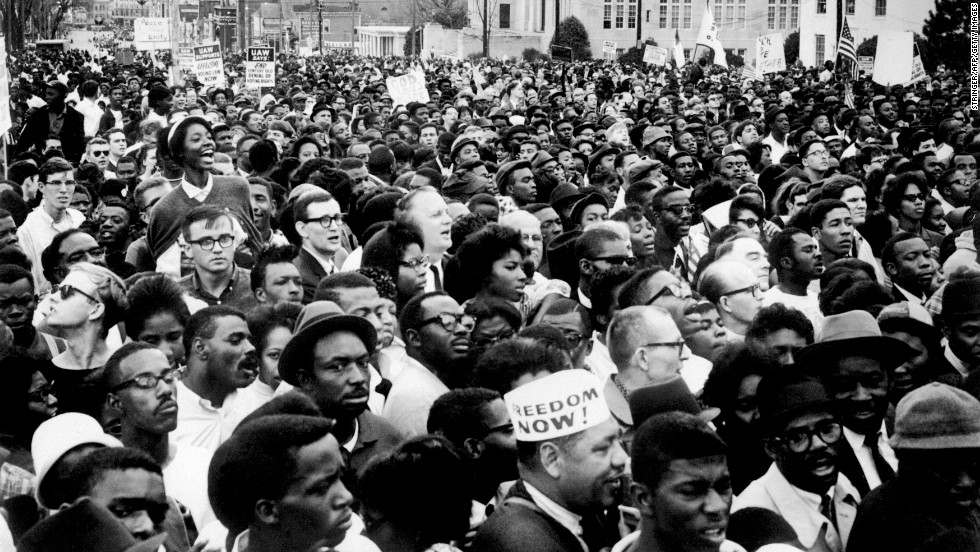
14 photos: Photos: The Voting Rights Act
The Voting Rights Act – Marchers during the 1965 voting rights campaign in Selma, Alabama gather for a rally on March 26, 1965, a few weeks after "Bloody Sunday." Black residents were beaten, fired from their jobs and imprisoned trying to vote.
Hide Caption
4 of 14
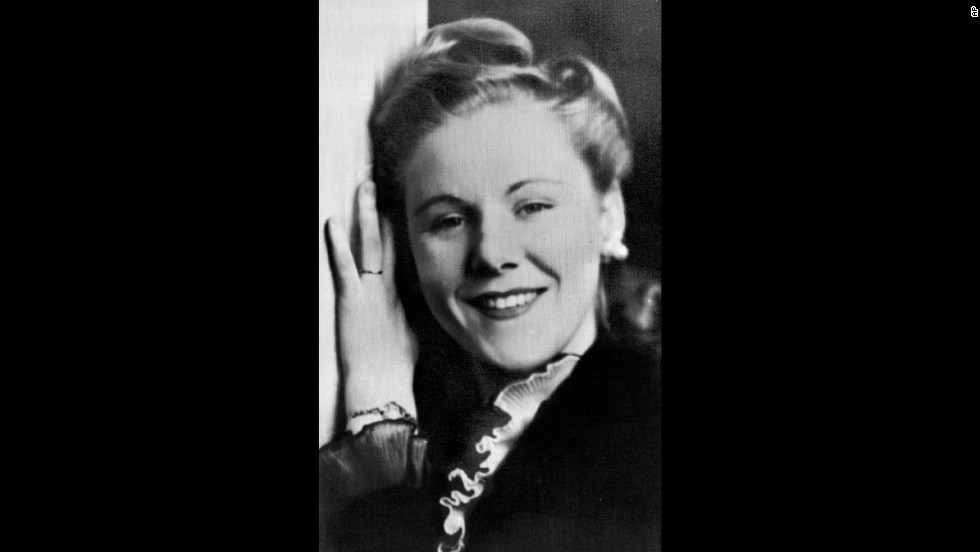
14 photos: Photos: The Voting Rights Act
The Voting Rights Act – Viola Liuzzo, a Detroit housewife, was murdered while participating in the voting rights campaign in Selma, Alabama, in 1965. Her death outraged the nation and helped spur passage of the Voting Rights Act.
Hide Caption
5 of 14
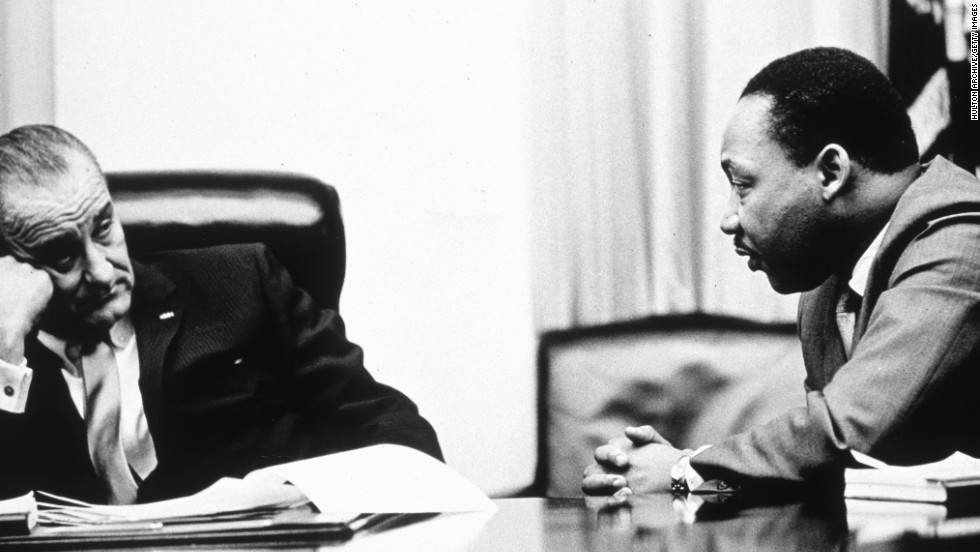
14 photos: Photos: The Voting Rights Act
The Voting Rights Act – President Lyndon Johnson, pictured here discussing the act with the Rev. Martin Luther King Jr. in 1965, went on national television to call for passage of the Voting Rights Act. He ended his speech by saying, "And we shall overcome."
Hide Caption
6 of 14
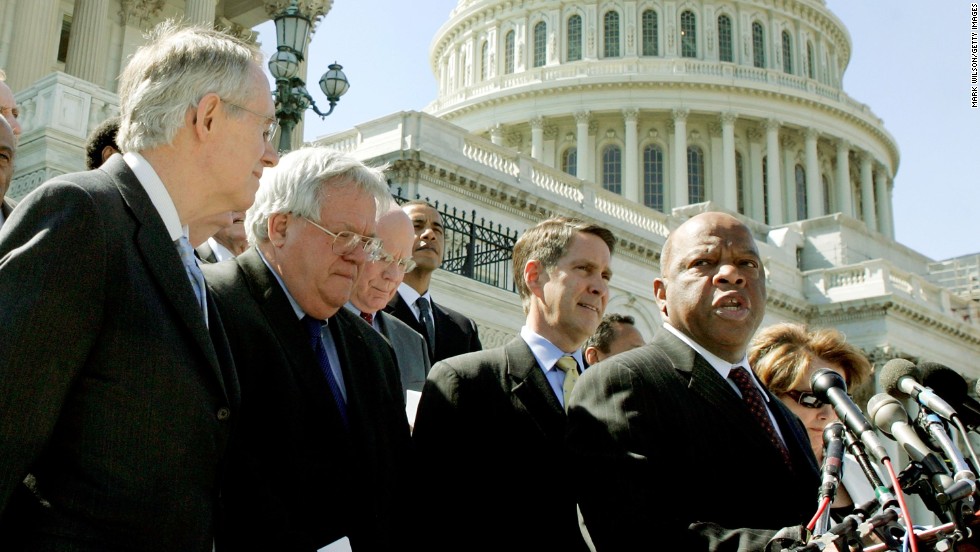
14 photos: Photos: The Voting Rights Act
The Voting Rights Act – Rep. John Lewis speaks after bipartisan House and Senate officials met to voice support for reauthorizing the Voting Rights Act for an additional 25 years on May 2, 2006. From left, Senate Minority Leader Harry Reid, House Speaker Dennis Hastert, Senate Majority Leader Bill Frist and other officials listen during the media conference.
Hide Caption
7 of 14

14 photos: Photos: The Voting Rights Act
The Voting Rights Act – President George W. Bush signs reauthorization of the act on July 27, 2006. From left, Rep. John Conyers, D-Michigan, Rep. James Sensenbrenner, R-Wisconsin, House Minority Leader Nancy Pelosi, D-California, Sen. Harry Reid, D-Nevada, and Sen. Bill Frist, R-Tennessee, look on.
Hide Caption
8 of 14

14 photos: Photos: The Voting Rights Act
The Voting Rights Act – President Barack Obama marches with civil right veterans during a commemoration march in 2007.
Hide Caption
9 of 14

14 photos: Photos: The Voting Rights Act
The Voting Rights Act – A conservative judge called the Voting Rights Act a racial entitlement but supporters of the act say it is the crowning victory of the civil rights movement. Pictured, people gather for a post-march rally after crossing the Edmund Pettus Bridge on the "Bloody Sunday" anniversary, March 4, 2012.
Hide Caption
10 of 14

14 photos: Photos: The Voting Rights Act
The Voting Rights Act – Lawyers' Committee for Civil Rights Under Law Executive Director Barbara Arnwine speaks during a news conference to voice opposition to state photo ID voter laws with the Rev. Jesse Jackson and members of Congress at the U.S. Capitol July 13, 2011.
Hide Caption
11 of 14

14 photos: Photos: The Voting Rights Act
The Voting Rights Act – A supporter of the Voting Rights Act rallies in the South Carolina State House in Columbia on February 26, 2013, the day before oral hearings at the Supreme Court.
Hide Caption
12 of 14

14 photos: Photos: The Voting Rights Act
The Voting Rights Act – The Rev. Jesse Jackson, at the microphone, and the Rev. Al Sharpton, left, deliver remarks during a rally outside the U.S. Supreme Court on February 27, 2013, as the court prepared to hear oral arguments in Shelby County v. Holder, the legal challenge to Section 5 of the Voting Rights Act.
Hide Caption
13 of 14

14 photos: Photos: The Voting Rights Act
The Voting Rights Act – Supporters of the Voting Rights Act listen to speakers discussing the rulings outside the U.S. Supreme Court building on Tuesday, June 25, 2013.
Hide Caption
14 of 14

14 photos: Photos: The Voting Rights Act
The Voting Rights Act – The Voting Rights Act is often called the crown jewel of the civil rights movement, yet many Americans do not know why or how it was passed. Pictured, NAACP Field Director Charles White speaks on the steps of the U.S. Supreme Court on Tuesday, June 25, 2013, after the court limited use of a major part of the landmark Voting Rights Act of 1965, in effect invalidating a key enforcement provision. Here are some key moments and characters in the voting rights saga.
Hide Caption
1 of 14

14 photos: Photos: The Voting Rights Act
The Voting Rights Act – Three young civil rights workers were murdered in 1964 in Mississippi while trying to register black voters. The infamous murders showed that segregationists were willing to kill to keep African-Americans from voting.
Hide Caption
2 of 14

14 photos: Photos: The Voting Rights Act
The Voting Rights Act – John Lewis, a young activist who later became a congressman of Georgia, heads to a fateful encounter on the Edmund Pettus Bridge in Selma, Alabama during a 1965 march. Lewis was brutally assaulted by state troopers during the "Bloody Sunday" march that made voting rights a national issue.
Hide Caption
3 of 14

14 photos: Photos: The Voting Rights Act
The Voting Rights Act – Marchers during the 1965 voting rights campaign in Selma, Alabama gather for a rally on March 26, 1965, a few weeks after "Bloody Sunday." Black residents were beaten, fired from their jobs and imprisoned trying to vote.
Hide Caption
4 of 14

14 photos: Photos: The Voting Rights Act
The Voting Rights Act – Viola Liuzzo, a Detroit housewife, was murdered while participating in the voting rights campaign in Selma, Alabama, in 1965. Her death outraged the nation and helped spur passage of the Voting Rights Act.
Hide Caption
5 of 14

14 photos: Photos: The Voting Rights Act
The Voting Rights Act – President Lyndon Johnson, pictured here discussing the act with the Rev. Martin Luther King Jr. in 1965, went on national television to call for passage of the Voting Rights Act. He ended his speech by saying, "And we shall overcome."
Hide Caption
6 of 14

14 photos: Photos: The Voting Rights Act
The Voting Rights Act – Rep. John Lewis speaks after bipartisan House and Senate officials met to voice support for reauthorizing the Voting Rights Act for an additional 25 years on May 2, 2006. From left, Senate Minority Leader Harry Reid, House Speaker Dennis Hastert, Senate Majority Leader Bill Frist and other officials listen during the media conference.
Hide Caption
7 of 14


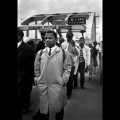





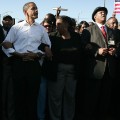





"It is our obligation to ensure that recipients of federal funding are in compliance
with federal laws that guarantee equal access and opportunity for all," said
Stephanie Jones, the U.S. Department of Transportation's civil rights acting director.
with federal laws that guarantee equal access and opportunity for all," said
Stephanie Jones, the U.S. Department of Transportation's civil rights acting director.
"Our concern rests in the possibility that the state's closure of driver license offices
disproportionately constrains the ability of some residents to secure driving
privileges, register personal and commercial vehicles, and obtain proper
identification a critical requirement for access to essential activities such as
opening a bank account and voting," she said.
disproportionately constrains the ability of some residents to secure driving
privileges, register personal and commercial vehicles, and obtain proper
identification a critical requirement for access to essential activities such as
opening a bank account and voting," she said.
The agency will be requesting all documents and information that explains why
these specific 34 DMV locations were picked for closure or reduced service "and
why not others," Foxx said.
these specific 34 DMV locations were picked for closure or reduced service "and
why not others," Foxx said.
DOT says it has not reached any conclusions but if it finds these closures are
discriminatory, the agency will first allow the state to come into compliance by
making those services available once again. If Alabama does not comply, the
Department of Transportation says it could strip the state of millions of dollars in
federal funding that's used towards DMV programs.
discriminatory, the agency will first allow the state to come into compliance by
making those services available once again. If Alabama does not comply, the
Department of Transportation says it could strip the state of millions of dollars in
federal funding that's used towards DMV programs.
Questioned whether stripping the state of federal funding would only further
negatively impact the communities DOT is trying to protect Foxx said the agency
is still gathering information "I don't want to presuppose the outcome at this point,
we need to go and get the facts but I think that the recourse we have is fairly
effective we've seen it work in previous cases. Hopefully we won't get there but if
we do we will be very aggressive."
negatively impact the communities DOT is trying to protect Foxx said the agency
is still gathering information "I don't want to presuppose the outcome at this point,
we need to go and get the facts but I think that the recourse we have is fairly
effective we've seen it work in previous cases. Hopefully we won't get there but if
we do we will be very aggressive."
In October, Rep. Terri Sewell, the only African-American in the state's
congressional delegation, asked the Department of Justice to launch an
investigation.
congressional delegation, asked the Department of Justice to launch an
investigation.
The state of Alabama declined to comment on the investigation.
It's unclear when the DOT will complete its investigation or whether it will be
done before the November 2016 election, though Foxx said the agency is working
to get it done as soon as possible.
done before the November 2016 election, though Foxx said the agency is working
to get it done as soon as possible.
Subscribe to:
Posts (Atom)
